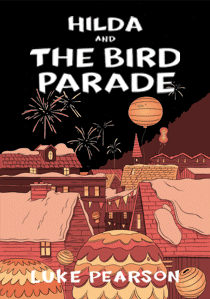CREATOR PROFILE:
MARJANE SATRAPI

Biography:
“The real war is not between the West and the East. The real war is between intelligent and stupid people. There is much more in common between George Bush and the fanatics in my country than between me and the fanatics of my country.”
Marjane Satrapi
Marjane Satrapi (1969- ) was born in Rasht, Iran, and currently lives in Paris. She grew up in Tehran through the fall of the Shah in 1979, and the Islamic revolution and the war with Iraq which followed. Now living in Paris, she was encouraged by David B., author of Epileptic and co-founder of the independent publishing collective L’Association, to translate her remarkable experiences into comics form. Between 2000 and 2003, Marjane wrote and drew a series of four autobiographical volumes of Persepolis published in French by L’Association, one each year. Her first volume went on to win the Alph’ Art Award for best debut album at 2001’s Angouleme International Comics Festival in France. The series has gone through multiple editions, making it L’Association’s third biggest selling title, and was translated all across Europe. Finally, in 2003, an English language edition of Persepolis was published in the UK and USA.
Essential Reading:

The Complete Persepolis
Pantheon, 2007
Persepolis is the story of Satrapi’s unforgettable childhood and coming of age within a large and loving family in Tehran during the Islamic Revolution; of the contradictions between private life and public life in a country plagued by political upheaval; of her high school years in Vienna facing the trials of adolescence far from her family; of her homecoming—both sweet and terrible; and, finally, of her self-imposed exile from her beloved homeland. It is the chronicle of a girlhood and adolescence at once outrageous and familiar, a young life entwined with the history of her country yet filled with the universal trials and joys of growing up.
Paul Gravett says:
Marjane draws with a spare directness in bold black and white and with the power of the very finest woodcuts. Hers is the sort of solo account of history, intimate, often funny, sometimes devastating, which can say so much more than any factual textbook or CNN coverage… The comic medium is ideally suited to tell the personal, yet universal, first person stories that can immerse us in the humanity and reality all but ignored or trivialised by the mass media.
Joe Sacco says:
I cannot praise enough Satrapi’s moving account of growing up as a spirited young girl in revolutionary and wartime Iran. Persepolis is a disarming and often humorous, but ultimately it is shattering.
Marjane Satrapi says:
The news hides the complexity of a society. They talk about politics but never about people who are suffering it’s consequences and who are fighting for more freedom. Nor about the poor, who don’t have the possibility of leaving.

Chicken With Plums
Pantheon, 2006
When Nasser Ali Khan, Marjane Satrapi’s great-uncle, discovers that his beloved instrument is irreparably damaged, he takes to his bed, renouncing the world and all its pleasures. Over the course of the week that follows, we are treated to vivid scenes of his encounters with family and friends, flashbacks to his childhood, and flash-forwards to his children’s future. And as the pieces of his story fall into place, we begin to understand the breadth of his decision to let go of life.

Embroideries
Pantheon, 2005
Embroideries recounts an afternoon of tea drinking and talking between Marjane, her mother, grand-mother, friends and neighbours. Naturally, the subject turns to love, sex and the vargaries of men. As the afternoon progresses, these vibrant women share their secrets, their regrets and often their outrageous stories, with subjects ranging from how to escape an arranged marriage, the miracles of plastic surgery, the benefits of being a mistress and how to fake your virginity. These are stories about the lengths to which some women will go to keep a man or, most importantly, keep up appearances.
Paul Gravett says:
“Let her air out her heart. There’s nothing better than talking!” That’s the advice from the Grandma of Satrapi, author of the two volume best-seller Persepolis, in her very frank, very funny record of what Iranian women discuss among themselves. Yes, it’s no different than anywhere else: it’s mostly about men and sex and this smart little hardback will have you in stitches. As for that title, she is not just referring to these ladies skills as seamstresses, or at elaborating their confessional yarns. She is also describing the practice in Iran of ‘restoring’ a woman’s lost virginity. Humour and insight in equal measure.
Bibliography:
Graphic Novels:
The Complete Persepolis (2007)
Chicken With Plums (2006)
Embroideries (2005)
Persepolis Vol 2 (2004)
Persepolis Vol 1 (2003)
For Children:
Monsters Are Afraid Of The Moon (2006)
Links:
Official Sites:
New York Time Blog (Discontinued)
Film: Persepolis
Online Resources:
Paul Gravett’s Articles
Publishers:
Pantheon


